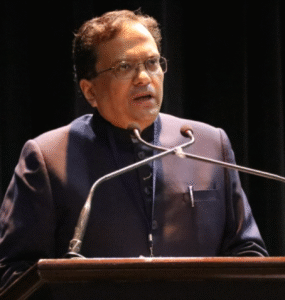Kochi, Kerala | October 10, 2025: Union Home Secretary Govind Mohan on Friday inaugurated the 18th edition of c0c0n, India’s premier international cybersecurity and hacking conference, organized by the Kerala Police and the Information Security Research Association (ISRA). Addressing delegates at the opening ceremony in Kochi, he called for a renewed focus on indigenous cybersecurity solutions and technology-led policing to tackle the growing wave of digital crimes.
“I had heard of c0c0n much before joining as Home Secretary. The idea of such a conference has always impressed me,” Mohan said, describing the platform as a vital convergence of thought, technology, and enforcement.
Internet’s growth brings “massive opportunities and new-age crimes”

Mohan highlighted how the rapid expansion of internet connectivity has reshaped both progress and policing.
“The massive proliferation of the internet has brought great advantages and equally great challenges. We are witnessing new breeds of crimes — digital arrests, financial frauds, sextortion, and online impersonation — that affect people across the globe,” he said.
He warned that cyberattacks are increasingly targeting critical infrastructure, including metro networks, power grids, and hospitals.
“Websites are being hacked, and DDoS attacks can cripple essential systems. These are not just technical concerns but law and order issues,” he noted.
FCRF Launches CCLP Program to Train India’s Next Generation of Cyber Law Practitioners
I4C and citizen response networks strengthening cyber defence
Highlighting the government’s institutional response, Mohan said the Indian Cyber Crime Coordination Centre (I4C) has emerged as a key national arm for combating cybercrime.
“In seven years, I4C has become a very effective mechanism to fight cybercrime and now works in real time with police forces across all states and Union Territories,” he said.
The Home Secretary urged citizens to report incidents through Cybercrime.gov.in or the 1930 helpline, which are directly linked to major banks to freeze and recover fraudulent transactions.
“We are also enabling mechanisms to return defrauded money without the need to register an FIR,” he announced.
Mohan said the government’s focus on awareness campaigns is yielding results, noting a sharp drop in “digital arrest” cases after Prime Minister Narendra Modi’s public address on the issue earlier this year.
CyMAC platform to protect government systems
Mohan revealed that the government has also established the Cyber Multi-Agency Centre (CyMAC) — a unified defence mechanism to secure critical digital infrastructure across departments.
“Smart cities, hospitals, and power networks were found vulnerable to attacks. The CyMAC platform, working with multiple departments, now steps in immediately whenever a government system faces a cyber incident,” he said.
The platform is being expanded to include state governments to strengthen India’s collective cyber resilience.
Call for homegrown cyber solutions
Calling for technological self-reliance in cybersecurity, Mohan urged industry leaders, researchers, and innovators to develop indigenous tools and frameworks.
“Criminals can now easily mask their identity. We must create homegrown solutions that can keep pace with global technology,” he said.
He identified three major enablers of cybercrime that need urgent regulation and technological oversight:
- VPN misuse – increasingly exploited for illegal activities, including pornography and narcotics trafficking.
- Cryptocurrency – widely used to launder proceeds of cybercrime.
- The Dark Web – a persistent hub for stolen data, illegal trade, and organized cybercriminal operations.
“I urge all cybersecurity professionals and researchers to focus on developing indigenous capabilities to counter these challenges,” Mohan said.
c0c0n 2025 unites enforcement and innovation
The week-long c0c0n 2025 (October 7–11) includes three days of intensive training followed by two days of plenary sessions. The event features participation from top agencies including NIA, CBI, IB, RAW, NCRB, BPR&D, and CERT-In, alongside global industry experts, startups, and academic institutions.
Sessions this year focus on AI-driven threat intelligence, blockchain forensics, online child protection, and critical infrastructure security — underscoring how cybersecurity is no longer a niche concern but a shared national priority.
“Our vision is clear — to create a cyber-resilient India where awareness, innovation, and enforcement work together. Let us make cybersecurity a people’s movement,” Mohan said in his concluding remarks.
The inauguration of c0c0n 2025 reaffirmed India’s evolving approach to cybersecurity — combining law enforcement, technology, and public participation. As threats grow more complex, the call for indigenous innovation and real-time response systems echoed strongly across the conference halls of Kochi.



